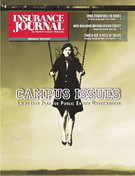Our special report on public entities in this issue focuses on the trouble educational institutions are having finding affordable coverage, or any coverage at all. “In most cases we find underwriters are not willing to provide any quote for distressed accounts,” broker Kim Wells told Southeast Editor Dave Thomas, the author of the story which begins on page IV of the National section.
While Dave takes on the broad view, I thought I’d pare things back a little bit by looking at a couple of smaller Midwest agencies who’ve been able to succeed in the public entity world (see page 33). That’s no mean feat considering the complexity of the risks and the politics underlying so many of these decisions.
Interestingly, when it came to the financial aspect of landing public entity business—do you have to give to receive?—my sources told me that there are no guarantees. Roosevelt Haywood estimates his brokerage produces 80 percent of the public entity insurance business in Gary, Ind. He said he gives money “to make it a non-issue.” You never want to wonder, he said, if that’s the reason why you didn’t make a deal.
Well, in spite of the money they’ve been pouring into the Republican leadership, it appears doctors and insurers aren’t getting the bank for their buck. According to the watchdog Center for Responsive Politics, Republican Senate Majority Leader Bill Frist has received $355,778 since 1999 from the health and insurance industries. Meanwhile, House Speaker Dennis Hastert, also a Republican, has hauled in $198,500 from the same two groups since 2003. Yet medical malpractice reform remains stranded in the Senate thanks to Democratic opponents, and according to National Editor Andrea Ortega-Wells the broken med-mal system is taking its toll on overall health-care costs.
So they’re left to figure out something on their own. To judge from the news, the reason doctors get sued is because they’re heartless and uncommunicative. Heartless: A recent story in the Wall Street Journal reported on the latest method to keep doctors out of trouble with the law: say you’re sorry. Apparently, doctors who admit their mistakes and wear their hearts on their sleeves are less likely to be sued.
Uncommunicative: Operating under the assumption that computers can talk to people better than doctors can, a Chicago-based firm called Rightfield Solutions has designed a series of online tutorials to explain surgical procedures in an easy-to-understand way. By making sure patients understand what they’re getting into, doctors and hospitals can cut down the frequency of severity of malpractice suits. See the full story on page 30.
I may be no doctor when it comes to lousy communication skills, but even I know when it’s almost time to stop. That said, please feel free to give me a call in my Chicago office at (773) 381-1572 to compliment, quibble or complain.
Thanks for reading!
Was this article valuable?
Here are more articles you may enjoy.


 State Farm Adjuster’s Opinion Does Not Override Policy Exclusion in MS Sewage Backup
State Farm Adjuster’s Opinion Does Not Override Policy Exclusion in MS Sewage Backup  Former Broker, Co-Defendant Sentenced to 20 Years in Fraudulent ACA Sign-Ups
Former Broker, Co-Defendant Sentenced to 20 Years in Fraudulent ACA Sign-Ups  Florida Engineers: Winds Under 110 mph Simply Do Not Damage Concrete Tiles
Florida Engineers: Winds Under 110 mph Simply Do Not Damage Concrete Tiles  AI Claim Assistant Now Taking Auto Damage Claims Calls at Travelers
AI Claim Assistant Now Taking Auto Damage Claims Calls at Travelers 


